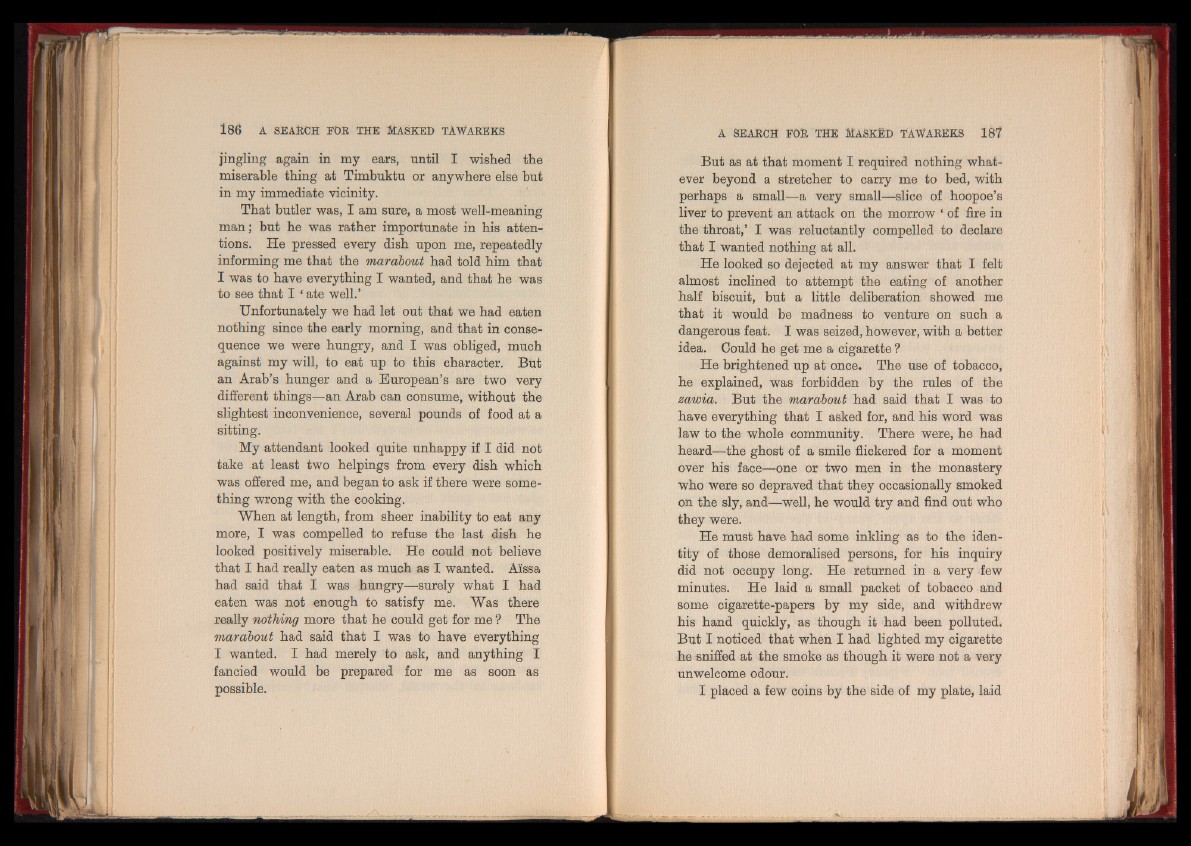
jingling again in my ears, until I wished the
miserable thing at Timbuktu or anywhere else but
in my immediate vicinity.
That butler was, I am sure, a most well-meaning
man; but he was rather importunate in his attentions.
He pressed every dish upon me, repeatedly
informing me that the marabout had told him that
I was to have everything I wanted, and that he was
to see that I ‘ ate well.’
Unfortunately we had let out that we had eaten
nothing since the early morning, and that in consequence
we were hungry, and I was obliged, much
against my will, to eat up to this character. But
an Arab’s hunger and a European’s are two very
different things—an Arab can consume, without the
slightest inconvenience, several pounds of food at a
sitting.
My attendant looked quite unhappy if I did not
take at least two helpings from every dish which
was offered me, and began to ask if there were something
wrong with the cooking.
When at length, from sheer inability to eat any
more, I was compelled to refuse the last dish he
looked positively miserable. He could not believe
that I had really eaten as much as I wanted. Aissa
had said that I was hungry—surely what I had
eaten was not enough to satisfy me. Was there
really nothing more that he could get for me ? The
marabout had said that I was to have everything
I wanted. I had merely to ask, and anything I
fancied would be prepared for me as soon as
possible.
But as at that moment I required nothing whatever
beyond a stretcher to carry me to bed, with
perhaps a small—a very small—slice of hoopoe’s
liver to prevent an attack on the morrow ‘ of fire in
the throat,’ I was reluctantly compelled to declare
that I wanted nothing at all.
He looked so dejected at my answer that I felt
almost inclined to attempt the eating of another
half biscuit, but a little deliberation showed me
that it would be madness to venture on such a
dangerous feat. I was seized, however, with a better
idea. Could he get me a cigarette ?
He brightened up at once. The use of tobacco,
he explained, was forbidden by the rules of the
zawia. But the marabout had said that I was to
have everything that I asked for, and his word was
law to the whole community. There were, he had
heard—the ghost of a smile flickered for a moment
over his face—one or two men in the monastery
who were so depraved that they occasionally smoked
on the sly, and—well, he would try and find out who
they were.
He must have had some inkling as to the identity
of those demoralised persons, for his inquiry
did not occupy long. He returned in a very few
minutes. He laid a small packet of tobacco and
some cigarette-papers by my side, and withdrew
his hand quickly, as though it had been polluted.
But I noticed that when I had lighted my cigarette
he sniffed at the smoke as though it were not a very
unwelcome odour.
I placed a few coins by the side of my plate, laid